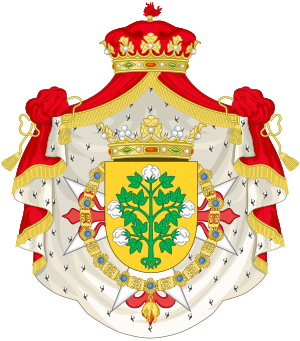Nicolás Cotoner, 23rd Marquess of Mondéjar facts for kids
Quick facts for kids
The Most Excellent
The Marquess of Mondéjar
|
|
|---|---|

Coat of Arms of Nicolás Cotoner, 23rd Marquess of Mondéjar
|
|
| Head of the Royal Household of Spain | |
| In office 1975–1990 |
|
| Monarch | Juan Carlos I |
| Preceded by | Office established |
| Succeeded by | Sabino Fernández Campo, 1st Count of Latores |
| Personal details | |
| Born | 19 October 1905 Palma de Mallorca, Spain |
| Died | March 6, 1996 (aged 90) Madrid, Spain |
| Military service | |
| Allegiance | Nationalist faction Spanish State Spanish Army |
| Battles/wars | Spanish Civil War |
Nicolás Cotoner y Cotoner (born October 19, 1905 – died March 6, 1996) was an important Spanish nobleman and military officer. He was the head of the Royal Household of Spain for King Juan Carlos I from 1975 to 1990. This means he was in charge of the King's personal staff and official duties.
Contents
Who Was Nicolás Cotoner?
Nicolás Cotoner came from a well-known noble family called the House of Cotoner. He held several important titles, including Marquess of Mondéjar and Count of Tendilla. He was also a Grandee of Spain, which is a very high rank for a Spanish nobleman. He was a knight in important orders like the Order of the Golden Fleece and the Order of Calatrava.
His Life and Career
Nicolás Cotoner studied law. He became a lieutenant in the military during the Spanish Civil War. He was seriously injured during the war and received a special award called the individual military medal. Later, he became a general in the cavalry, which is a part of the army that historically rode horses.
He was married to María Trinidad Martos y Zabálburu. She came from a wealthy family and owned a lot of land.
Working with King Juan Carlos I
Nicolás Cotoner first became involved with the future King Juan Carlos I in 1955. At that time, Juan Carlos was still a prince. Cotoner helped teach him horse riding and prepared him for joining the General Military Academy in Zaragoza.
He also acted as a link between Prince Juan Carlos and his father, Juan de Borbón, who was living in exile in Portugal. This was especially important during difficult times, like deciding who would lead Spain after the death of Francisco Franco.
In 1964, Prince Juan Carlos's father appointed Cotoner as the head of the Prince's own household. Eleven years later, when Franco died and Juan Carlos became King of Spain, Nicolás Cotoner was chosen to be the Chief of the Royal Household of Spain. He held this very important position from December 2, 1975, until January 22, 1990.
Important Roles and Support
Besides leading the Royal Household, Nicolás Cotoner also became the president of the National Heritage Board of Directors in 1976. This board manages royal palaces, monasteries, and other important historical sites in Spain.
King Juan Carlos I saw Nicolás Cotoner as an "adoptive father" and a "faithful counselor." Cotoner was known for being very trustworthy, especially during the difficult period when Spain was changing from a dictatorship to a democracy, known as the Spanish transition to democracy.
He played a key role during the failed Tejero coup on February 23, 1981. During this attempted coup, he actively supported the King and helped connect the King with different parts of the army. This was a very tense time for Spain, and his actions helped keep the country stable.
Nicolás Cotoner received many high honors, including the Order of the Golden Fleece in 1977. He passed away on March 6, 1996, at the age of 90.
See also
 In Spanish: Nicolás Cotoner y Cotoner para niños
In Spanish: Nicolás Cotoner y Cotoner para niños
- Royal Household of Spain
- Spanish transition to democracy
 | Jessica Watkins |
 | Robert Henry Lawrence Jr. |
 | Mae Jemison |
 | Sian Proctor |
 | Guion Bluford |

